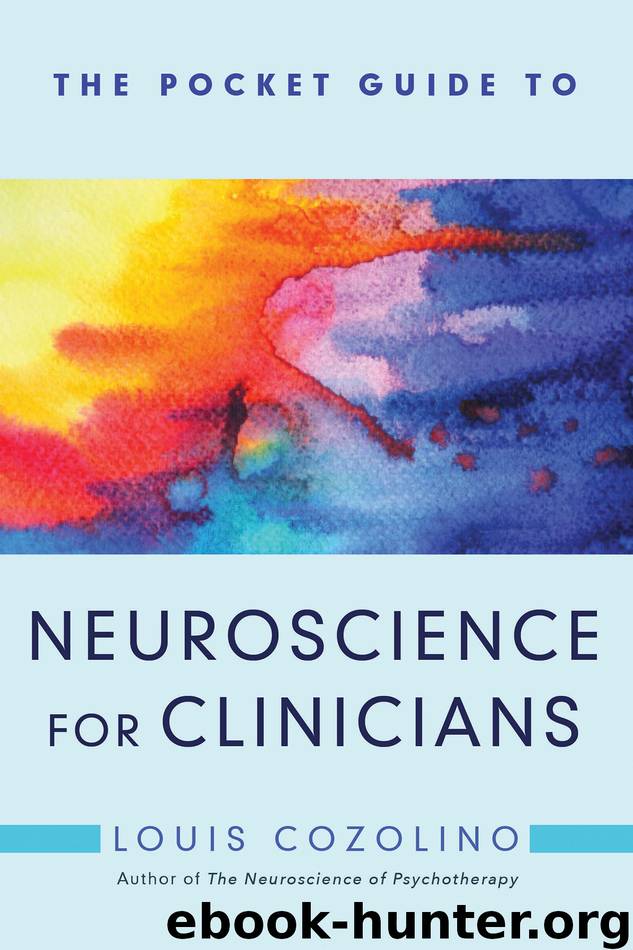The Pocket Guide to Neuroscience for Clinicians by Louis Cozolino

Author:Louis Cozolino
Language: eng
Format: epub
Tags: Epub3
Publisher: W. W. Norton & Company
POLYVAGAL TRANSITION
If you must break the law, do it to seize power.
—JULIUS CAESAR
At the next level of arousal regulation is the social engagement or polyvagal system, discussed in an earlier chapter. Porges hypothesized three states of arousal: (1) dorsal vagal (withdrawal, shame, shutdown); (2) sympathetic (activation, motivation, fight-flight); and (3) ventral vagal (approach, connection, self-reflection, attachment). Clients locked in despair and immobilization are disconnected from their power, anger, and assertiveness. Stuck in this dorsal vagal state, they try to move directly to a ventral vagal state (approach and connection) but find it too frightening. They will suffer with immobility and intense shame, not about anything they have done, but about their very existence.
In order to attain connection, they need first to learn how to activate their sympathetic nervous system, experience anger, discover their power, and learn to manifest it in constructive and contact-full ways. We all need to have access to our strength in order to feel safe enough to be truly close to others. Many of us, including most therapists, are frightened by our anger and power because of past experiences of rage at the hands of others. Because of this, many try to form relationships with themselves and others while avoiding any strong feelings.
These clients often suffer from difficulty establishing and maintaining boundaries, and engaging in self-care, and come with a long list of unexplained physical symptoms. The therapeutic challenge is to help them shift from playing possum to being activated, assertive, and in touch with their own power. The therapeutic relationship requires the attainment of both sympathetic and ventral vagal states for attunement and connection. Because plasticity and learning depend upon a sense of safety, shifting from a dorsal vagal to a ventral vagal state of arousal is essential for a positive outcome in psychotherapy and incorporating these gains into one’s life.
Accomplishing this shift requires careful therapeutic work in combination with experiments in living focused on self-care and being assertive in the face of those we find threatening. For many people, engaging in martial arts, competitive sports, and other physical challenges serve as an interim step between depression and reconnection with the social world. It’s important to teach your clients that anger in the service of attachment and protection (of both yourself and your loved ones) is the somatic foundation for developing psychological boundaries. We may need to first be able to establish boundaries in three-dimensional space as a precursor for the psychological boundaries we later develop in interpersonal relationships.
Download
This site does not store any files on its server. We only index and link to content provided by other sites. Please contact the content providers to delete copyright contents if any and email us, we'll remove relevant links or contents immediately.
Periodization Training for Sports by Tudor Bompa(8253)
Why We Sleep: Unlocking the Power of Sleep and Dreams by Matthew Walker(6701)
Paper Towns by Green John(5177)
The Immortal Life of Henrietta Lacks by Rebecca Skloot(4573)
The Sports Rules Book by Human Kinetics(4379)
Dynamic Alignment Through Imagery by Eric Franklin(4208)
ACSM's Complete Guide to Fitness & Health by ACSM(4055)
Kaplan MCAT Organic Chemistry Review: Created for MCAT 2015 (Kaplan Test Prep) by Kaplan(4004)
Introduction to Kinesiology by Shirl J. Hoffman(3765)
Livewired by David Eagleman(3764)
The Death of the Heart by Elizabeth Bowen(3608)
The River of Consciousness by Oliver Sacks(3599)
Alchemy and Alchemists by C. J. S. Thompson(3514)
Bad Pharma by Ben Goldacre(3422)
Descartes' Error by Antonio Damasio(3270)
The Emperor of All Maladies: A Biography of Cancer by Siddhartha Mukherjee(3145)
The Gene: An Intimate History by Siddhartha Mukherjee(3093)
The Fate of Rome: Climate, Disease, and the End of an Empire (The Princeton History of the Ancient World) by Kyle Harper(3055)
Kaplan MCAT Behavioral Sciences Review: Created for MCAT 2015 (Kaplan Test Prep) by Kaplan(2981)
